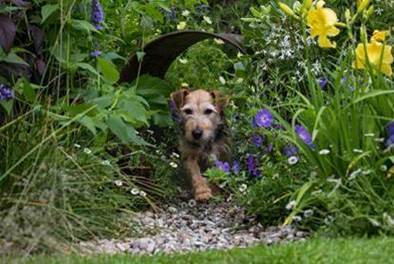Whilst lockdown may have given the green fingered among us extra time to tend to their gardens, it’s important to remember that certain plants and flowers can be harmful to dogs if eaten.
Whether you have acres of land, a patio or small balcony, Dogs Trust, the UK’s largest dog welfare charity, is advising dog owners of the poisonous plants to watch out for when sprucing up your garden.
The charity is also advising owners to be on the lookout for any signs their dog may be sensitive or allergic to certain plants – signs such as overzealous scratching, excessive licking and biting of paws, or even weeping or inflamed eyes. Check your dog’s coat, skin and ears regularly to look for redness and irritation, to identify any early changes that may need veterinary attention.
Paula Boyden, Dogs Trust Veterinary Director said:
“Whilst many people will have been sprucing up their gardens during lockdown, as dog lovers we need to be mindful of the risks that some plant types can pose to our canine companions.
“You can still have a beautiful garden if you have a dog, but just be aware that certain plants and flowers can be harmful to dogs due to the toxins if eaten. If you have any plants in the house make sure that they are kept up high, out of your dog’s reach.
“If you think that your dog may have ingested garden plants or is showing signs of being unwell, speak to your vet immediately.”
Here are some of our top tips on making your garden a fun and safe place for your dog:
- Watch out for summer plants and flowers which can be toxic to your dog.
- Keep your dog safe by making sure your garden is secure. Judge the height of any fences based on your dog’s breed and temperament and regularly check for any gaps that your dog can wriggle through.
- Provide a variety of textures in your garden for extra sensory stimulation. This could be non-toxic sand, grass, wood chippings or gravel, which may provide interesting places to hide dog toys and treats and for your dog to explore.
- Include a whole variety of different plants including herbs to ensure your dog experiences lots of different smells.
- Create a fun area for your dog to dig and play. If your dog loves to dig to uncover things, create a space for them to show off their digging prowess and praise them for using this spot. Clean, shallow water features are also a great place to cool off on hot summer days.
- Avoid using products which may be toxic to dogs such as slug bait, rat poison and weed killer.
- Gardens can harbour unwanted friends such as slugs and ticks so ensure your dog’s flea, tick and worming treatments are up to date.
- Provide features with different heights that can give dogs vantage points to enjoy. Railways sleepers, steps and small benches can all be used to create versatility.
- Ensure there is a shaded spot for your pooch in hot weather. Dogs heat up quickly and cool down very differently to humans and heatstroke can result in serious complications for dogs.
- Make sure your compost heap and any fermenting fruit within are kept where dogs cannot reach.




